Taim al-Haj | Hebaa Shahada
“In the absence of judicial mechanisms, the Organization for the Prohibition of Chemical Weapons (OPCW) continues to prove Syrian regime crimes against people who died of suffocation or still suffer from the side effects of chemical weapons’ exposure even after survival. “
While no effective moves have been taken against the regime since “OPCW” started operating in Syria in 2013, its last report issued by its Investigation and Identification Team (IIT), gives a glimmer of hope to human right activists and opposing Syrian politicians.
The OPCW’s investigation held the Syrian regime responsible for three chemical attacks in Hama countryside, and provided profound irrefutable evidence for the regime, and which would be less logical for Russia to deny.
The report received an American and European welcome but faced skepticism from Russia. The Syrian regime rebutted it, considering it to be “false, misleading and fake,” while its opponents regarded it as an excellent opportunity to incite global actions in order to protect Syrian people and prevent atrocity crimes of the al-Assad regime.
This file discusses all strengths of the organization’s recent investigation, as well as its distinguishing attributes to previous issued investigations and reports. This edition also sheds light on how the findings of this investigation can be exploited legally and politically, as well as the possible chances of converting it into accountability tools and pressure on the Syrian regime and its allies.
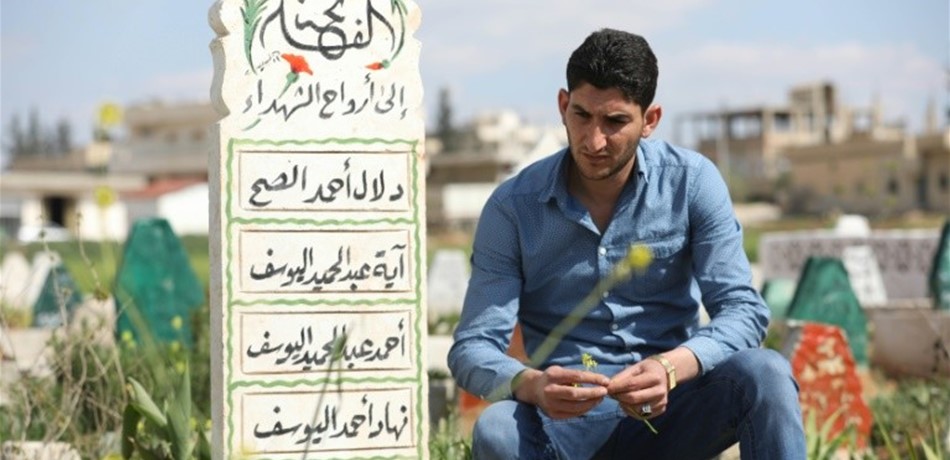
Abdul Hamid al-Youssef, lost 19 members of his family in the Khan Sheikhoun massacre, visiting the graves of his relatives – 2 April 2018 (AFP)
More powerful investigation
The Syrian regime is accused of chemical attacks … The door is open to “condemnation”
The “OPCW” issued a report on 8 of the current month, in which it held the Syrian regime responsible for three chemical attacks that targeted Lataminah city on 24, 25, and 30 March in 2017.
The report stated that a SU-22 military airplane belonging to the “50th Brigade” of the 22nd Air Force Division affiliated to the regime forces departed at 6:00 a.m. on 24 March 2017 from Shayrat airbase, south of Homs.
The report elaborated that the airplane dropped an M4000 aerial bomb containing sarin in southern Lataminah, affecting at least 16 persons.
The second chemical attack took place one day later at approximately 03:00 p.m. using a helicopter that departed Hama airbase and struck later the Lataminah Hospital with a chlorine cylinder affecting at least 30 people.
On 30 March 2017, a Su-22 military airplane belonging to the “50th Brigade” of the 22nd Air Division affiliated to the regime forces, took off from Shayrat airbase and dropped an M4000 aerial bomb containing sarin in southern Lataminah, affecting at least 60 people.
The report concluded that these attacks would not have been carried out without the knowledge of higher authorities of the Syrian regime military command. The IIT stressed that it is not a judicial body, and this matter should be considered by the Security Council and the state parties of the Chemical Weapons Convention (CWC).
Evidence and Methodology Strengths
The director of the “Syrian Center for Justice and Accountability” (SCJA), Muhammad al-Abdullah, regarded the report as very important, despite its narrow scope, as it examines strikes that took place in one area, confirming at the same time the depth of the investigation as well as its findings.
One indication of this strength is that the investigation did not rely only on witness testimonies, but also included samples and materials from the stage soil. It also used forensic documents, which confirmed the Syrian regime’s use of chemical weapons in a cut-clear way, without any confusion.
Speaking to Enab Baladi, Muhammad al-Abdullah, said that this report could be the first step towards holding the regime accountable for its crimes and drag it later into future trials. al-Abdullah expected the regime will face mountains of evidence, making it difficult for it to challenge its credibility and evidentiary strength.
The report’s methodology is also added to its strengths as it did not only focus on investigating strikes which occurred in Lataminah but also took into account denying all allegations and scenarios that the chemical attacks on the city were staged, or “false flagged” with the aim of spreading fake news about the Syrian regime.
The report refuted several scenarios, including that in which rebel factions within the regime may be behind the attacks. It also considered a scenario in which these assaults could have been carried out by independent units affiliated to the regime without the leadership’s knowledge or consent.
Al-Abdullah pointed out that the report examined all these scenarios, and concluded the absence of all evidence suggesting any of them to be real. It has also concluded that access to these types of weapons and their launching pads can only be done through a decision by senior officials in the Syrian Air Force. This could determine the shape of the political impact and undermine all allegations and claims made by Russia about the chemical attacks being staged or false flagged.
Favorable conditions for greater effectiveness
Both the chairpersons of the “Syrian Network for Human Rights” (SNHR), Fadl Abdel-Ghany, and SCJA director, Muhammad al-Abdullah, share the same point of view regarding the Lataminah report’s points of strength, especially that it condemns the Syrian regime directly.
Abdel-Ghany believes that the present report confirmed the regime’s use of chemical weapons, which is a clear breach of the CWC, hence allowing member states, including Russia, to hold it accountable. Based on this report, the regime has violated the United Nations Security Council Resolution No. 2118.
In an interview with Enab Baladi, Abdel-Ghany said that the present report resembles reports issued by the “Joint Investigation Mechanism” (JIM) established by the Security Council Resolution No. 2235 in August 2015.
In his talk about the IIT report, Abdul-Ghany said that the report is distinguished by two main points; first, the ideal of circumstances in which those attacks occurred, implying the decision-makers’ prior knowledge.
The second is the IIT reliance on the analysis of chemical weapons samples obtained directly from the Syrian regime in January 2016, to find later that the collected samples at Lataminah sites match those handed by the regime.
More reports to come
The IIT report is part of a series of investigations held by a team of international inspectors who chose nine incidents to address, starting by the three Lataminah attacks, with only six other assaults on their list of priorities, according to SNHR’s chairman, Fadel Abdel-Ghany.
Other attacks the IIT plans to investigate involve assaults on Idlib and Hama governorates in 2014: al-Tamanah on 12 and 18 April and Kafr Zita on 18 April, respectively. Future investigations also included attacks that occurred in Aleppo countryside in the town of Marea on 1 September 2015 and Saraqib attack on 4 February 2018, as well as Douma assault, in the suburbs of Damascus on 7 April 2018. The SNHR is not authorized to declare any future investigations in the coming phase.
No such perfect investigation
Mechanism defects
Despite the fact that the OPCW’s investigation offered in-depth irrefutable evidence, the director of SCJA, Muhammad al-Abdullah, considered that it had overlooked some key points.
The Lataminah report was unable to reveal the military chain-of-command structure
responsible for these three attacks, which means that it did not refer to officers who authorized to carry out the attacks.
According to al-Abdullah, revealing this kind of information could have been a pillar to this report, in what it is called “correlative evidence,” which could be done through providing evidence that certain officers with a specific ranking gave instructions and set general policy for the use of chemical weapons, as well as making the final decisions.
Collecting “correlative evidence” is done through witness testimonies or obtaining documents from the regime itself. Al-Abdullah attributed the absence of such information to the difficulty of accessing information about the regime.
Although there is an apparent lack of information about the responsible officials for Lataminah attacks, al-Abdullah considers the report a landmark that should consider providing and documenting information about them later.
Bellingcat investigation supports IIT’s
The investigation group “Bellingcat” published on 15 of this month an investigation that confirmed the presence of Syrian officers on the outskirts of Lataminah city, in conjunction with a chemical attack on a hospital in the city.
The investigation mentioned that on the same day of the chlorine attack on the hospital, on 25 March, a delegation of generals arrived at the outskirts of Lataminah city. The delegation included both the Minister of Defense, Major General Ali Abdullah Ayoub, and the commander of the “Tiger Forces,” Brigadier Suhail al-Hassan.
The “bellingcat” investigation shows that these officers were likely at the command post observing strikes on Lataminah, less than two hours before the chlorine attack on the hospital.
The organization relied on two methods to determine the time of the visit by analyzing the shadows in the video published by the state-run Syrian Arab News Agency (SANA), which was deleted later. Both methods confirm that the video was taped before the hospital was struck by chlorine. The investigation estimated that the attack took place on 25 March in 2017 between 12:00 p.m. and 2:00 p.m., while the watch of the Minister of Defense in the Syrian regime does appear to show about 1:15 p.m.
During this visit, “SANA” recorded live feeds of airstrikes on the city, and by drawing straight lines through fixed points on the map, it became possible to determine the actual coordinates of the raids.
Although these lines are not a solid proof that the airstrikes carried out in conjunction with the officers’ presence portray the chemical strike on the hospital, they do demonstrate that the visitors were observing strikes carried out on Lataminah city.
The organization concluded that the presence of General Ayoub and Brigadier al-Hassan at a command post observing strikes on the Lataminah city two hours before the chlorine attack is a potentially significant fact.
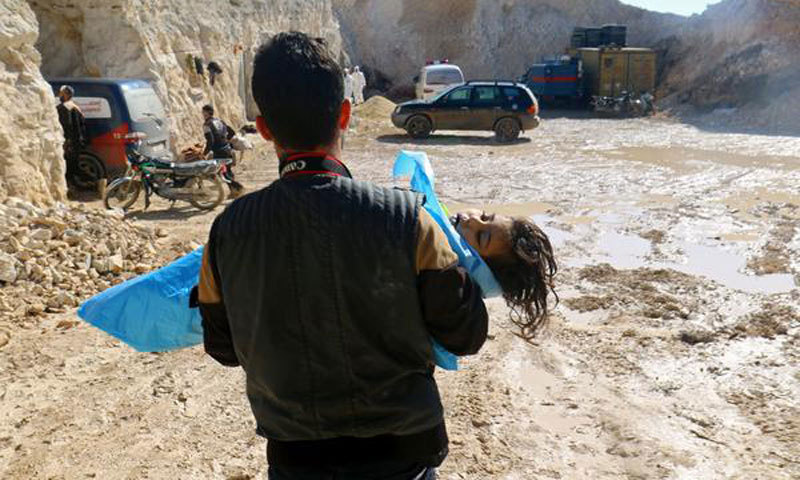
A young man carrying a dead girl of a chemical attack on the town of Khan Sheikhoun in Idlib countryside – 4 April 2017 (Reuters)
Between 2013 and 2020
Five different missions and mechanisms affiliated to OPCW in Syria
The OPCW has been actively involved in Syria since it acceded to the Chemical Weapons Convention (CWC), in October 2013, which prohibits the use, development, production, stockpiling, and transfer of chemical weapons. Since then, the OPCW has submitted 67 reports related to its investigations into the use and destruction of chemical weapons in Syria through its teams and missions.
OPCW-UN Joint Mission
It was formally established on 16 October 2013, under the Security Council Resolution “2118” issued on 27 September 2013, to oversee the elimination of the chemical weapons arsenal of the Syrian regime most safely and securely possible. Its operations drew to a close on 30 September 2014.
The mission submitted monthly reports on its operations. In the final report, the director of the OPCW said that the mission “had successfully conducted its work under extremely challenging and complex circumstances.”
OPCW Fact-Finding Mission (FFM)
In response to persistent allegations of chemical weapon attacks in Syria, the OPCW Fact-Finding Mission (FFM) was set up on 29 April 2014 “to establish facts surrounding allegations of the use of toxic chemicals, reportedly (chlorine), for hostile purposes in the Syrian Arab Republic.”
The FFM is required to study available information relating to allegations of use of chemical weapons in Syria, including information provided by the Syrian regime and others.
Since May 2014, the FFM interviews witnesses and obtains samples and physical evidence for analysis and has looked into several incidents of alleged use of chemical weapons in Syria. The FFM has confirmed with a “high degree of confidence” that chlorine and mustard were used as weapons in Syria.
The FFM has submitted about 22 reports to States Parties of the CWC and the UN Security Council, and the first was in June 2014 while the last one was in March 2019.
In these reports, the FFM talked about its inability to perform its work due to an attack on its convoy while heading for Kafr Zita in the northern Hama countryside. Thus it was obliged to interview witnesses at a safe location outside of Syria as an alternative to conduct its work. The FFM work included parts of Hama northern countryside, Idlib, Khan Sheikhoun, Saraqib, al-Hamdaniya in Aleppo, as well as Douma in Damascus countryside.
The Declaration Assessment Team (DAT)
The DAT was established in 2014 to work with the relevant Syrian authorities to resolve the identified gaps and inconsistencies in whether Syria’s declaration about destroying its chemical weapons arsenal to the OPCW was complete and correct when questions were raised.
The team of experts known as the (DAT) has undertaken over 20 visits to Syria, held several meetings with Syrian authorities, visited former chemical weapons sites, and has taken samples.
The DAT was unable to resolve all identified gaps, inconsistencies, and discrepancies in the Syrian regime’s declaration, therefore it cannot thoroughly verify that Syria has submitted a statement that can be considered accurate and complete in accordance with the CWC, according to a report issued in 2016.
The team submitted six reports to the UN, and its mandate remains valid to determine whether Syria’s chemical arsenal was fully destroyed or not.
OPCW-UN Joint Investigative Mechanism (JIM)
The FFM’s findings were the basis for the work of the OPCW-UN Joint Investigative Mechanism (JIM), aiming to identify the perpetrators of the chemical weapon attacks confirmed by the FFM.
The JIM was established by the UN Security Council Resolution 2235, on 7 August 2015, its mandate expired in November 2017. The JIM consists of a three-member leadership panel.
In its report submitted on 26 October 2017, the team concluded that evidence was sufficient and reliable to hold the so-called Islamic State (IS) responsible for using sulfur mustard gas in September 2016 on Umm Hawsh village, in the countryside of Aleppo.
The JIM held the Syrian regime responsible for the release of sarin at Khan Sheikhoun on 4 April 2017, in addition to its responsibility for the launching of three chlorine attacks between 2014 and 2015 documented in six different reports.
Investigation and Identification Team (IIT)
The IIT is responsible for identifying the perpetrators of the use of chemical weapons in Syria, based on all information relevant to those chemical weapons attacks confirmed by the OPCW’s Fact-Finding Mission (FFM), as well as cases for which the OPCW-UN Joint Investigative Mechanism (JIM) has not identified the perpetrators of chemical weapons use in Syria.
The IIT is mandated by the decisions of the Conference of the States Parties entitled “Addressing the Threat from Chemical Weapons Use” on 27 June 2018.
The IIT has issued its first report on 8 of the current month, in which it holds the Syrian regime responsible for the use of chemical weapons in Lataminah city, northern Hama countryside, in March 2017.
Would the next step be legal or political?
Would the investigation contribute to a move against the Syrian regime?
The many strengths in the investigation of the OPCW, which prove the Syrian regime’s involvement in three chemical attacks in 2017, raise questions about its effectiveness in changing the de facto situation, by holding the Syrian regime to account with judicial mechanisms, or using the file to open the door for political action.
Both the chairmen of SNHR, Fadl Abdel-Ghany, and SCJA, Mohammad al-Abdullah, described the investigation findings as ammunition that can be used to hold the Syrian regime accountable for its atrocities.
Generally, issued reports by international investigation committees and bodies cannot be regarded as judicial trials unless authorized explicitly in the mandate. Thus, the findings in those reports are not adjudications. Still, they hold a significant legal value for various reasons, according to what Mansour al-Omari, a Syrian journalist and human rights lawyer, said in a previous interview with Enab Baladi.
Al-Omari added that in case the OPCW board decided to hold a meeting based on its latest report, the board might agree to undertake certain measures, including suspending or restricting Syria’s rights inside the OPCW, or recommending collective measures in accordance with international law, or even might decide on displaying the report to the UN or the Security Council.
As for international responses, countries such as the United States and Europe may take individual measures, such as imposing sanctions on entities and individuals involved in those attacks. In addition, Syrian human rights organizations may consider the possibility of filing lawsuits.
This was confirmed by a briefing with senior officials in the US State Department about the chemical weapons report, as one of the officials said that, according to custom, when such reports appear, it must be reported to Security Council to take the necessary measures, just as was the case with the Iranian nuclear program, as reported by US State Department website.
However, the mechanism above is currently not available, according to the same US official, because of Russia, backed by China, blocking any attempts to condemn the Syrian regime.
In the meantime, these reports can be important sources for future trials in case the Syrian file was submitted to the Security Council, or in the event of establishing a special court in Syria, if the al-Assad regime fell and the Syrian judiciary system became independent and efficient, as al-Omari put it.
The OPCW says that it is not a judicial or quasi-judicial body with authority to assign individual criminal responsibility, nor has the authority to make final findings on non-compliance with the convention. It added that FFM work is similar to that of any international fact-finding bodies or investigative committees, being the implementing body for the CWC.
An opportunity for political action
The chairman of the “SNHR,” believes that accountability does not necessarily mean a trial or the judicial path that may take a long time, explaining that now is the right time for the Security Council to take action and use Chapter VII, which includes the imposition of military sanctions on the Syrian regime, and allows the use of force against the regime to undermine the use of airports through which chemical bombing of civilians is conducted. Fadel Abdul-Ghany stressed that the following report should be used to exert pressure on both Russia and the Syrian Regime to force them accelerate the process of political change in Syria.
The director of the “SCJA,” Muhammad al-Abdullah, also considered that the obtained evidence from the report on Lataminah attacks is huge and that the United States, France, Germany, Britain along with all countries which refuse to use chemical weapons can use these shreds of evidence to make progress in the political process in Syria.
The “National Coalition of the Syrian Revolution and Opposition Forces” (NCSRO) welcomed the OPCW’s Investigation and Identification Team (IIT) report. The “NCSRO” also called for an international action in accordance with Chapter VII of the UN Charter and in line with UN Security Council Resolution 2118 to hold the Syrian regime to account.
For his part, Yahya al-Aridi, spokesperson for “the Syrian High Negotiations Committee” and a member of the opposition delegation in the “Constitutional Committee,” described the report of the “OPCW” on Lataminah attacks as “very important.” to Enab Baladi.
Al-Aridi also called “all those carrying Syrians’ trust and echoing their voices, and all institutions labeling themselves as opposition to use this report in condemning the Syrian regime and work to activate the role of the international community and the Security Council by exerting pressure, so progress will be made to overthrow the regime and remove it.”
Opinion Poll: The investigation will not help into an actual move against the Syrian regime
Despite optimism experts and politicians have shown in their talks to Enab Baladi, the Syrian street seemed as if it lost all hope for any move that would put an end to the attacks of the Syrian regime.
For its part, Enab Baladi conducted an opinion poll on its Facebook page, asking the question: following the OPCW report findings, which held the Syrian regime responsible for three attacks in 2017 … Do you think it would be the beginning to grasp the Syrian regime to account under international law?”.
Fifty-nine percent of over 400 participants voted “No,” while 41 percent answered “Yes.” Meantime, almost all comments showed a lack of confidence in international movements, with a lack of a serious desire to hold the Syrian regime accountable.
شاركنا رأيك..
حمّلت منظمة حظر الأسلحة الكيماوية النظام السوري مسؤولية ثلاث هجمات في 2017.. هل تعتقد أن هذا بداية لمحاسبة النظام دوليًا؟Posted by جريدة عنب بلدي Enab Baladi on Thursday, 9 April 2020
A Constitutional Committee “is the solution”
Talking about the steps that could be taken by the “Syrian High Negotiations Committee” or the opposition delegation in the “Constitutional Committee” to benefit from the findings of this investigation, Yahya al-Aridi indicated that the only political step currently available is the “Constitutional Committee,” “one of the main axes for the implementation of the international resolution 2254 and a portal for a political solution.”
Al-Aridi proceeded by saying that what worries the regime most and pushes it to reject and hinder any political solution, is the criminal files of the atrocities it committed, which are a burden on the regime’s shoulders and shoulder of those who support him, especially Russia.
According to al-Aridi, the report’s findings can also be used by adding it to the “Caesar” law, which has become part of the legal system in America, especially now when the Syrian regime is struggling economically.
According to al-Aridi, “the High Negotiation Committee” is in touch with the UN Secretary-General Antonio Guterres almost on a daily basis, and many members of the Security Council, as well as the United States, to alter international positions into forceful condemnations of the regime.
if you think the article contain wrong information or you have additional details Send Correction
النسخة العربية من المقال
-
Follow us :
Most viewed
- Potential Erdoğan-Assad meeting in Moscow: Talks of excluding Iran
- European countries call for re-evaluation of policy towards Syria
- After Turkey and the opposition, SDF shows willingness to dialogue with Syrian regime
- Al-Assad reproduces Constitutional Committee through People's Assembly
- After al-Hasakah, AANES releases prisoners in Raqqa


















 A
A
A
A
A
A

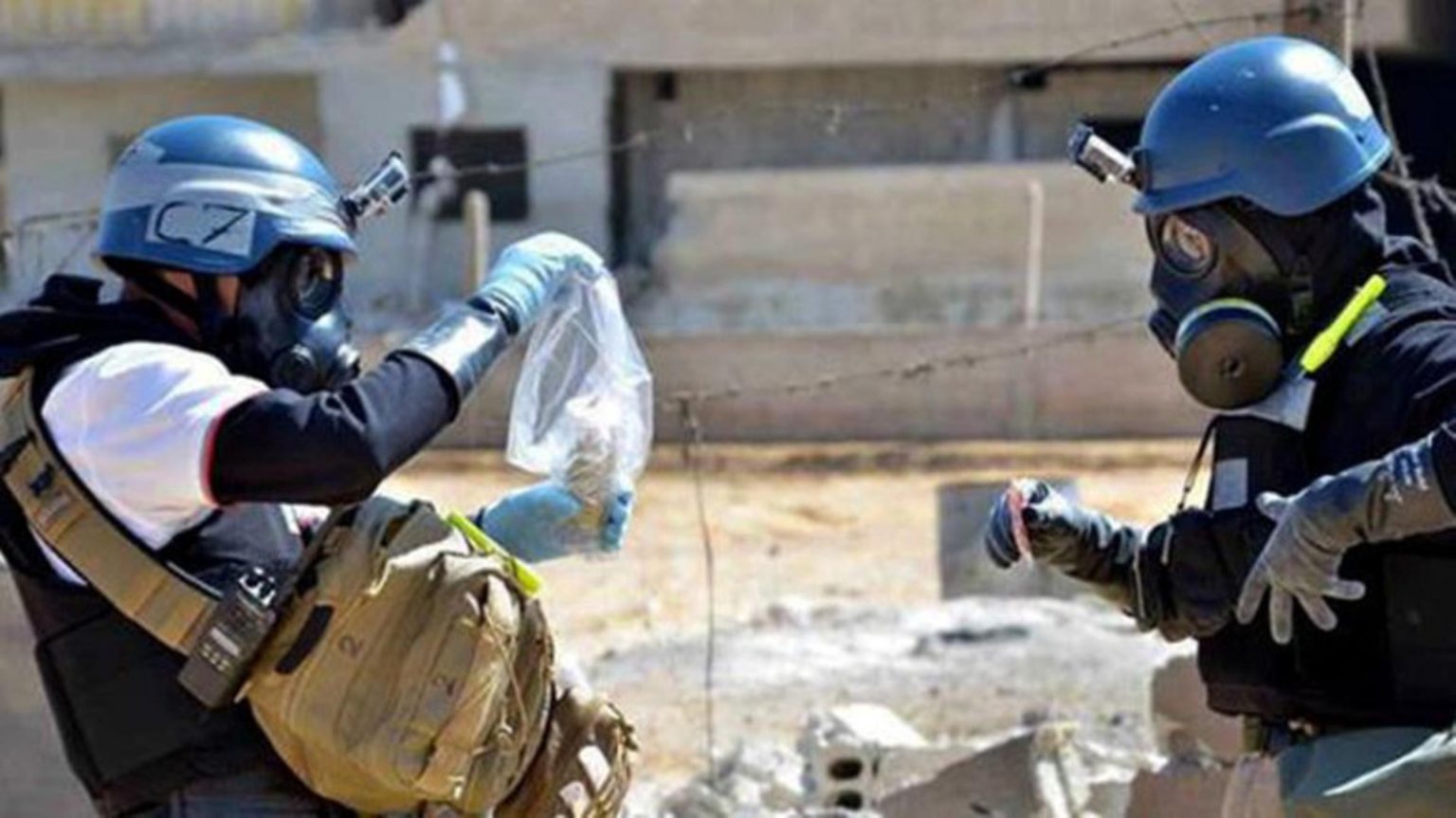
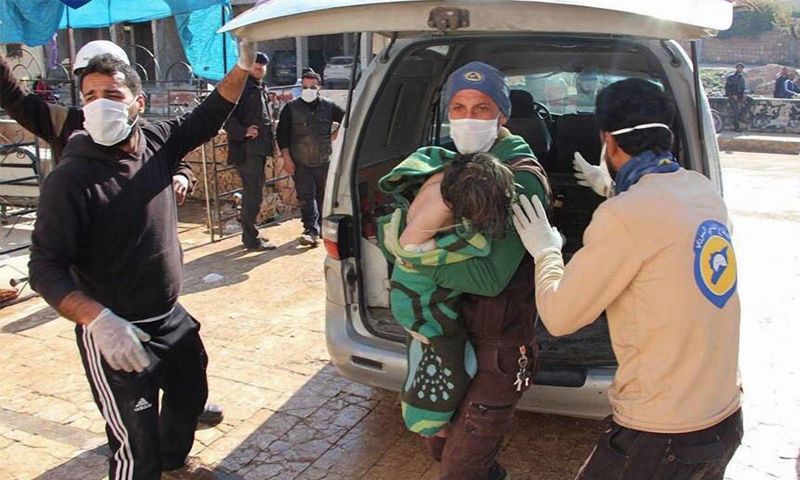
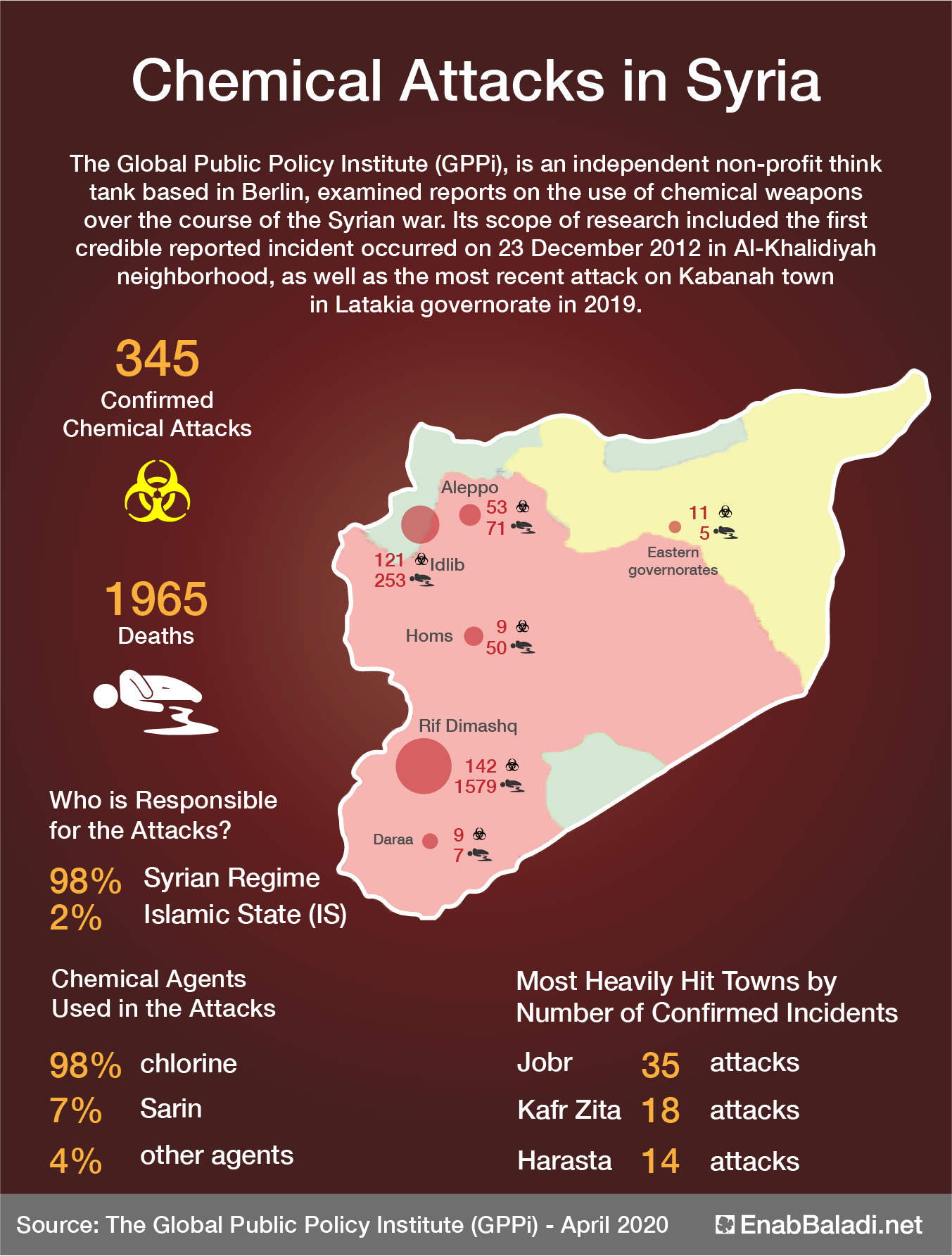
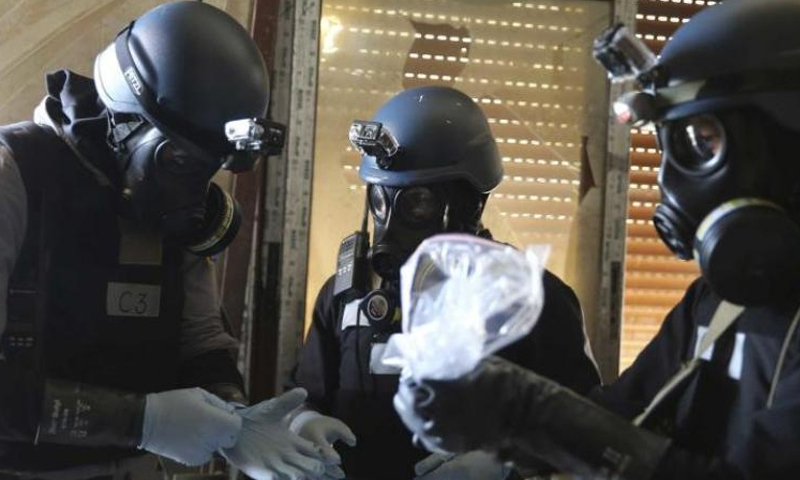


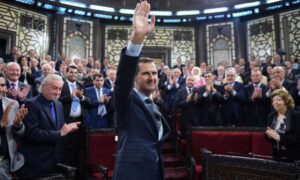
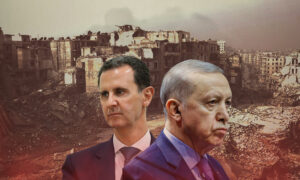

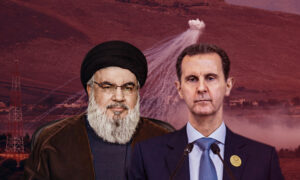
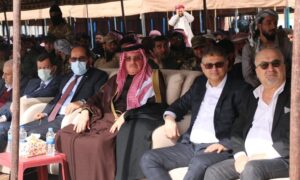
 More In-Depth
More In-Depth